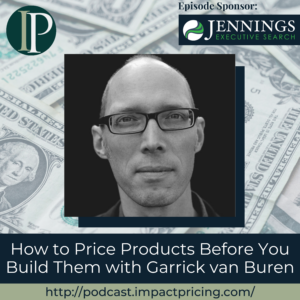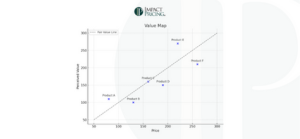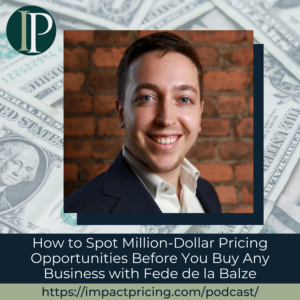
After years in operations management roles, he specialized in analytics and BI, leveraging his statistics-rich engineering degree. Zen constantly volunteers to support small business and young entrepreneurs.
In this episode, Zen shares how pricing is not about how much you invested now but the value you deliver. He also highlights that pricing is not something you do at the end just before the product launch; it’s something you do even before you design a product. He touched on Wine Pricing and what influences buyers’ purchasing decisions with spirit products. He made mention on the psychology of pricing in this regard. Other than that, he gives his thoughts on how pricing works in the petrol industry; the pricing metrics used to gauge buyers’ willingness to pay.
Podcast: Play in new window | Download
Why you have to check out today’s podcast:
- Learn about wine pricing and how its price is a strong indicator of the product’s quality and influences the ‘what’ and ‘how’ of buyers’ purchasing decisions
- Find out how petrol pricing works where an increase or decrease in the world’s oil price movement is concerned
- Find out why ‘pricing is a thing’ in your business
“Making sure your initial pricing doesn’t damage your brand and addresses more than one market segment, I think that’s the most common mistake I see with small businesses.”
– Zen Ore
Increase Your Pricing Knowledge: Become a Champions of Value INSIDER!
To sign up go to insider.championsofvalue.com
Topics Covered:
01:35 – How an impactful event in his life got him started in Pricing
03:27 – How do consumers base their purchase decision on when it comes to wine pricing
04:39 – Why Pricing is a thing
05:50 – How Petrol Pricing works
09:48 – Why gas price goes up the same time oil price goes up for the day even if lead time for the oil production takes days for it to be brought to the station
12:28 – How everyone else raises prices without collusion once world oil price goes up
12:43 – When do oil companies make a better margin
13:37 – Getting out of a price war
14:25 – How Zen’s Jewish-Buddhist background made him put a pro-bono tab on his pricing website
17:36 – Zen’s testimonial about Mark’s online courses
19:38 – The need to understand the mental toolkit for Pricing
Key Takeaways:
“They don’t understand that pricing is a thing. It’s not something you do at the end, occasionally, five minutes before you launch into the market. It’s something you have to think about way before you even start designing your service or product.” – Zen Ore
“There’s a lot of costing involved because that’s a factory, making wine is the factory, but the way pricing works, I think even without calling it by that name, it’s more psychological than one might think.” – Zen Ore
“We started playing with the metrics [petrol pricing], and we realized that yes, sometimes you can raise the price. As long as you raise another metric or another value driver, they will keep buying and you will maintain the same volume with the higher price. And I think that’s the business you want to have.” – Zen Ore
“[On his website’s pro bono tab] It’s me, showing that I believe in what I do, and I believe in what I understand about how people pay. You can pay as much as you want. And I’m not going to criticize you for this. And experience shows that’s actually not a bad financial decision on my end as well.” – Zen Ore
“Once you get accustomed to that kind of strategic thinking, it’s in your mental toolbox. And I think it’s the same with your courses. So, it doesn’t matter if you’re pricing petrol or you’re pricing fast-moving consumer goods or anything. You understand the mental toolkit for pricing. And I think that’s priceless.” – Zen Ore
Connect with Zen Ore:
Connect with Mark Stiving:
- Email: [email protected]
Full Interview Transcript:
(Note: This transcript was created with an AI transcription service. Please forgive any transcription or grammatical errors. We probably sounded better in real life.)
Zen Ore
Making sure your initial pricing doesn’t damage your brand and addresses more than one market segment. I think that’s the most common mistake I see with small businesses.
[Intro]
Mark Stiving
Welcome to Impact Pricing, the podcast where we discuss pricing, value, and the transcendent relationship between them. I’m Mark Stiving. Today our guest is Zen Ore. Here are three things you want to know about Zen before we start. He spent a year studying at the Wine Academy. I think I took the home study course. He’s been a management consultant in the hospitality industry for many years. And he now has the title of That Pricing Guy at Pricing is a Thing. Welcome, Zen!
Zen Ore
That’s it; I’m gone. Hi, Mark, thank you for having me on the show.
Mark Stiving
This is just going to be fun. I got to see while I was preparing for a call, I got more and more excited to talk to you because your name is Zen, your company name Pricing is a Thing, your title, ‘That Pricing Guy’, you have a pro bono tab on your web page. He is passionate about Jewish-Buddhist Pricing as a service. I have no idea where this conversation is going to go. Let’s start with how did you get into Pricing?
Zen Ore
Fantastic. Yeah, that might be good ease into it. I actually got into Pricing working in the hospitality and wine industry. And I noticed that…Well, at first I thought everybody buys just according to price. That makes sense. If it’s cheap they might buy more of it, if it’s expensive, they buy less. And especially if you work in silver dining or chef restaurants, you realize that that’s not the case. Some people buy wine. Some people buy the label, some people buy the price, they just want to get that champagne on the table, even if they don’t like it. One day, I worked at a wine shop, and my boss was a very respectable wine consultant, back in Israel. He had a winery calling him, and they had a very, very difficult problem. He charged them a pretty penny for that to solve their problem. And he solved it with a phone call. And I said, ‘Well, how come you charge so much for a phone call?’ I said, ‘Well, it’s not how much time I invested it now. It’s the value I provide.’ And I was very young to hear that, and I think it switched something in my head.
Mark Stiving
It’s always an event like that that just says to us, ‘Oh my gosh, it’s about value.’ Right? It’s about what am I delivering to somebody? And what are they getting from it? That’s a fabulous story. So, tell me…I actually wasn’t planning on asking this, but I’m going to ask it. Tell me about wine pricing. Because that seems to me to be the one product where the words price is a signal of quality is like dominant. I can’t think of another product where price is a more strong indicator of the quality and what, how people buy.
Zen Ore
Yes, exactly. Because I do have spirits come to mind, whiskey would be a very good example. But with whiskey, you would usually strive for consistency. If you buy your favorite brand, you expect to get roughly the same kind of experience. With wine, it changes every year, different vintage, different climate. And you see a label, you might get your favorite wine critic, and that’s about it. Most of the times you didn’t taste the wine and label presentation and price, those are basically what you base your purchase decision on. Obviously, there’s a lot of costing involved because that’s a factory, making wine is the factory, but the way pricing works, I think even without calling it by that name, it’s more psychological than one might think.
Mark Stiving
Yeah, I could absolutely buy that. Now what I did prepare, the question I really wanted to ask is, where did ‘pricing is a thing’ come from?
Zen Ore
You can say I’m a Pricing Analyst gone rogue. I used to be a Pricing Analyst for a petrol company back in Perth and then Australia and then I worked for a couple of corporations here in Sydney. And I realized that I want to help the small businesses and immediately as I started having the conversations with small business owners, I realize that that’s the main message. They don’t understand that pricing is a thing. It’s not something you do at the end, occasionally, five minutes before you launch into market. It’s something you have to think about way before you even start designing your service or product. And everybody is aware of tax. Everybody has a word of marketing. Everybody is aware of social media. And they don’t know that pricing is a thing. So, I decided to be the carrier of that so important message.
Mark Stiving
You know, I never thought of that before, but that’s absolutely true. How many times has someone asked me what I do? I say I’m a pricing expert. And the next words out of their mouth are, ‘What’s that?’
Zen Ore
So, you work five minutes a day?
Mark Stiving
Yeah, exactly. Tell me about petrol pricing. Or in the US here, we would call it gas or gasoline. And you were talking about independent gas stations, independent petrol stations. Just tell me what you want to tell me. And then if you haven’t answered my questions, I’ll ask you specific questions about this, because that business fascinates me.
Zen Ore
Cool. So, I started working as an operations manager in a petrol company. And as operations manager, basically, you’re in charge of three things, make sure we don’t run out of petrol. Procurement, make sure we charge the right price, we don’t want to be very expensive. That’s one of the brand values; we want to be relatively first, second, maybe third cheapest in every geographical micro-segment, because that’s where the volume is. And then, that’s the procurement pricing. And third bit would be, make sure that everything works. Liaising with trade if pump faults and everything like that. I started working there exactly following this directive, make sure nothing bad happens and we’re happy. And I come from a statistics background. So, after a couple of months, I said, ‘You know what, we can actually do that way better.’ Because with cost price and cost price for petrol changes every day, you get an email 6 am. We can actually try and build a forecast model around cost. And it doesn’t have to be an amazing forecast model because a fuel tank’s average lifespan in the service station is four days. You only have to get better than 50/50 chance, in a span of four days, that’s for a statistician, that’s not a big ask. We started working around that and doing some statistical modelling around petrol prices as cost. And then I said, ‘You know what, with sell price, we don’t necessarily have to just look at our competitions in every geographical micro-segment in order to set the price, we can actually look at other stuff, because the way we call it is hypothesis, and test customer value drivers beyond price.’ What makes you buy other than what’s the cheapest nearby, let’s go there. And we realized that actually, there’s so many metrics that influence your willingness to pay for petrol in this area, and some people will just go because they like the service, you remember their name, some people have their favorite newspaper, or if they can buy a good and healthy breakfast on the way to work, they’ll go and fill up at your place even though you’re a bit more expensive. We started testing that in market. And we started playing with the metrics, and we realized that yes, sometimes you can raise the price. As long as you raise another metric or another value driver, they will keep buying and you will maintain the same volume with the higher price. And I think that’s the business you want to have.
Mark Stiving
Nice. So, my rule is right-hand turns into gas stations.
Zen Ore
What side of the road do you drive in the States?
Mark Stiving
Right side. The thing that always fascinates me about gas station pricing is the way it tracks the price of oil. If the price of oil goes up today, the price of gas goes up today even though it takes 8 to 10 weeks for a drop of oil to come out of the ground and make it to that gas station. Can you explain why that happens?
Zen Ore
I can explain my best guess because we are basically retailers as a service station company so we don’t produce gas. But I think it’s just way too easy to immediately follow the trend in cost, rather than go into deep analysis of volume tracking, and that sort of stuff. We just say, you know what, what’s in the tanks is in the tanks. What’s in the gantry is in the gantry. From now on, it’s like when you open a restaurant, it’s what you put on the shelves. That’s it, you never see that money again. And then, if they raise the price for whiskey, you raise the price for whiskey. You don’t think about how many milliliters in the bottle when you bought it. You price according to market costs. And then most gas companies will usually follow the same cost-plus-margin formula with a quick up and down a couple of cents. And it’s the independent ones that caused all the trouble because they do that differently.
Advertisement
Pricing decisions feel risky. How nervous are you knowing you need to raise prices? When, where, and how much should you raise prices, so you don’t lose customers or lower your rate of new customer acquisition. It’s risky enough to make you want to put it off till next year, along with any growth. But pricing doesn’t have to be such a mystery. When I work with clients as their go-to resource for pricing advice, I help them better understand the value of their products, and how their buyers use price to make purchase decisions. We jointly create strategies they’re confident implementing. I can do the same for you. Together, you and I apply pricing frameworks to your price increase initiatives, or your new product launches, or even moving to new pricing models like subscriptions. The best pricing decision you can make right now is to gain access to proven pricing advice. Take some risk out of your pricing. Learn more at impactpricing.com/advisor. I look forward to working with you.
Mark Stiving
I think what you said is pretty consistent with what I’ve always taught. And that is, if the price of oil goes up, it’s a signal to everybody, ‘Hey, you can raise prices because everybody else is going to raise prices. So, let’s all raise prices together.’ Even though there’s no real collusion, nobody calls anybody and says, ‘Are you going to raise prices today?’ It’s just ‘Hey, let’s go raise prices.’
Zen Ore
Exactly. Because you’re not allowed to communicate. You’re not allowed to have that chat.
Mark Stiving
But something that I never thought about before is whoever you bought the gas from, they raised their prices too when the price of oil went up?
Zen Ore
Yes. And actually, that’s a trade secret I can share. We make better margin when the cost is high. Because then we know everybody’s going to raise the price. When the cost is low, everybody lowers their price, but they also lower the margin because they want to maintain the volume. When the price is high, that’s not where you’re most competitive. But, yeah…
Mark Stiving
I would actually argue that it’s probably when the price of oil is going up, you make a lot of margin. And when the price of oil is going down, you make… or when the price of oil is stable. I’ll put it that way. That’s when you make less margin, because now all the gas stations are pricing competitively. They’re trying to steal share, and we’ve got this consistent floor cost, that’s hurting us.
Zen Ore
Yes, it’s like all the kids in the kindergarten, they got nothing better to do so they stop fighting. And actually, that’s a very big issue with tactical pricing with service stations is how to get out of a price war. Because sometimes you lock horns with a competitor. And it’s a race to the bottom from there. There’s a lot to learn about how you get out of a price war without not being allowed to talk to them. How do you signal you want to go up?
Mark Stiving
I wanted to bring up with you just because I found this fascinating is, I have never seen a pro-bono tab on a pricing company’s website. Tell me how you put it up there and how I could get you to give me free pricing services.
Zen Ore
I’m a JewBu, which means I’m a Jewish-Buddhist. I come from Jewish heritage, I practice some Judaism practices, and I practice some Buddhist practices. I mainly meditate but a bit more than that. And both systems of thoughts propagate or call for giving, expecting nothing in return. It’s a way of saying, ‘If you want to feel good about life in general, if you want to just be happy, one of the mental tools you can use is practice that: giving, expecting nothing in return.’ It doesn’t have to be something very big. You can just give a donation to somebody on the street. It doesn’t matter what. Just do a random act of kindness. And you see how you feel. And when I started my business, and I think this is all consultants. See this too many times, the businesses that need us the most can’t afford it. And he told me about it because I can help you make more money. But you can’t afford my services, and I see you backing away. And I decided I’d never want to experience that again. If you’re a solopreneur, or you’re a fundraiser or charity, then I can either say, you know what, this is pro bono, especially if you’re a fundraiser or charity, I’ll do this pro bono. I just want you to raise money for your cause. And usually, with these kinds of organizations, there’s not a lot of analytics involved. It’s basically tactics, maybe a bit of strategy, and a lot of price presentation. And with solopreneurs, I do that a bit differently. So, if you’re a one-man show, one-woman show, you can’t afford that now. Your cash flow is basically non- existent, then I’ll tell you what, you pay what you can. You pay what you think is right. And again, it’s me, showing that I believe in what I do, and I believe in what I understand about how people pay. I’m happy to give you my services. Again, it doesn’t involve much analytics at this stage. And all you have to do is pay two times, one time at the end of the consultation. Once we have a price setting, and the second time is three months after that. That’s all you have to do. You can pay as much as you want. And I’m not going to criticize you for this. And experience shows, that’s actually not a bad financial decision on my end as well.
Mark Stiving
Yeah, I like that. I like the fact that you figured out a way to do pay as you want, or pay what you want, or pay what you can, or however you want to phrase that in the pricing world. I think that’s pretty cool. And you can even call it the consulting world, right? This is consulting.
Zen Ore
In that perspective
Mark Stiving
Yeah, I have a very similar philosophy. I love helping the entrepreneurs around my local Reno area. And oftentimes, they ask, ‘Well, how much do you charge?’ And my answer is always, ‘I’m very expensive, or I’m free.’
Zen Ore
And I have to say something on this note, I actually took a couple of your courses online. When I started to work as a corporate pricing analyst, the first thing that people look for is certificates. What’s your certificate in pricing? I was listening to your podcast then. And I said, ‘You know what, I need to try Mark’s online courses.’ And they’re amazing. They’re amazing courses. And they bring a lot of value, even to pricing professionals in just getting to understand the deeper concepts of pricing better. And I texted you on LinkedIn, I think it was two years ago. And I said, ‘Hi, Mark, I want to do this subscription. I couldn’t find the link.’ I think I was very tired. And you said, ‘Yes, and it’s $100 a month. But if you press this link over there, which you didn’t look at before, you can actually get the first month for $5.’ So, you actually willingly forfeited $95 just to make sure that this guy’s happy. And I’ll never forget that.
Mark Stiving
Well, I’m never doing that, again. I don’t think we have that special going. But now that you’ve said that, if you want to email me, I’ll see what I can do. I’ll give you the link at the end. But thank you very much. That was really nice of you to say that. I appreciate it. One of the things that I find interesting about pricing professionals, is they’re pricing consultants, and pricing consultants get exposed to lots of different businesses and industries. And so, you start taking these theoretical concepts and figuring out how do they apply in all these different situations. A lot of times pricing professionals are in one company, in one industry. You start to think that’s what pricing is. And that is what pricing is in that industry. But it takes looking around and looking at other industries and other situations and figuring out how these concepts apply to all these places. And I think that’s what I help pricing people do in these courses, is it isn’t just about your industry, these are the concepts and how they apply in different situations.
Zen Ore
Definitely because as a chess player, I can say that once you play chess and you kind of get used to that strategic thinking, let’s think not just what I want to do now or in two minutes, what do I want to do in 4, 5, 6, 7 steps? What do I want to do if that happens? Once you get accustomed to that kind of strategic thinking, it’s in your mental toolbox. And I think it’s the same with your courses. It doesn’t matter if you’re pricing petrol or you’re pricing fast-moving consumer goods or anything. You understand the mental toolkit for pricing. And I think that’s priceless.
Mark Stiving
Oh, thank you. So how much do I owe you for this ad?
Zen Ore
I’ll just send you an invoice.
Mark Stiving
Okay, thanks.
Zen Ore
Oh, you can pay as much as you think…
Mark Stiving
Yeah, exactly. Exactly. Alright, so, we’re going to run out of time here. But let me end with the final question. What’s one piece of pricing advice that you would give our listeners that you think would have a big impact on their business?
Zen Ore
Well, we didn’t discuss segmentation much. But I think making sure your initial pricing doesn’t damage your brand and addresses more than one market segment. I think that’s the most common mistake I see with small businesses. Not all customers value your product or service the same way. Make sure you address all of them.
Mark Stiving
Alright, I think I often say segmentation is the second most profitable thing you can do in pricing. The first is obviously adopting value-based pricing instead of cost-plus pricing.
Zen Ore
Definitely.
Mark Stiving
But absolutely, I think that’s great. Zen, that was fabulous. Thank you for your time. If anybody wants to contact you, how can they do that?
Zen Ore
The best way to contact me is either via LinkedIn Zen Ore, Z-E-N O-R-E or through my website, pricingisathing.com. If you also want the option to join my meetup groups, just go to meetup.com and search for 499 Pricing Discussion Group. And that’s a free discussion group for people to join, ensure their pricing challenges.
Mark Stiving
All right, and we’ll have a link to your LinkedIn page or something on our show notes so they’ll be able to reach out and find you. Great. Episode 108 is all done. Please take a moment to leave us a review on whatever platform you use, Apple, Stitcher, Podchaser. There are many of them. And finally, if you have any questions or comments about the podcast, or about pricing in general, feel free to email me [email protected]. Now, go make an impact!
Podcast: Play in new window | Download
Tags: Accelerate Your Subscription Business, ask a pricing expert, pricing metrics, pricing strategy















